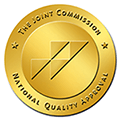Knee, Hip and Shoulder Replacement
The Orthopedic and Surgical Institute at Northern Nevada Medical Center provides comprehensive surgical and rehabilitative services for patients who have a total knee, hip or shoulder replacement.
If you need a referral to a physician at Northern Nevada Medical Center, call our free physician referral service at 775-356-6662 or search for a physician online.
Advanced Hip and Knee Certification
The Joint Center of Excellence at Northern Nevada Medical Center has earned Advanced Total Hip and Total Knee Replacement Certification from The Joint Commission. These certifications recognize NNMC’s commitment to providing the highest level of care for its knee replacement and hip replacement patients.
Total Hip Replacement
A total hip replacement is a surgical procedure in which the diseased or damaged cartilage and bone of the hip joint is surgically replaced with artificial materials. Total hip replacements are most commonly performed because of progressively severe arthritis, the most common of which is degenerative arthritis (osteoarthritis) of the hip joint. This type of arthritis generally occurs because of aging, a congenital abnormality of the hip joint or prior trauma to the hip joint. Other conditions that can lead to total hip replacement include bony fractures of the hip joint and necrosis (death) of the hip bone. Necrosis can be caused by a fracture of the hip, drugs (such as alcohol or corticosteroids), diseases (such as systemic lupus erythematosus) or kidney transplantation.
Progressively intense chronic pain, together with impairment of daily functions that include walking, climbing stairs and rising from a sitting position, may eventually become reasons to consider a total hip replacement. Because replaced hip joints can fail with time, the decision of whether and when to perform total hip replacement is not easy to make, especially in younger patients. Replacement generally is considered only after pain becomes so severe that it impedes normal function despite use of anti-inflammatory medications. A total hip joint replacement is an elective procedure, which means that it is an option selected among other alternatives.
Total Knee Replacement
Total knee replacement generally is done when a person has a severe degenerative joint disorder, such as osteoarthritis, in which the articular, or moving, surfaces of the knee deteriorate. That leads to severe pain, limitation or loss of function and/or deformity of the joint. Surgery may also be performed to replace a badly fractured knee, or when previous joint replacements have failed. Bilateral replacement means that both knees are replaced at the same time.
Because having a total knee replacement is not an easy decision to make, other treatments commonly are used before surgery. They include:
- Acetaminophen or anti-inflammatory drugs if the joint has degenerated
- A procedure called synovectomy, which is surgical removal of inflamed synovial tissue, the tissue that lubricates moving parts of a joint
- Osteotomy, which is restructuring of the bones to shift stresses from diseased tissue to more healthy tissue
Total Shoulder Replacement
Total shoulder replacement is less common than knee or hip replacement surgery but is often used to treat severe fractures, as well as other painful shoulder conditions. Those conditions include:
- Osteoarthritis (degenerative joint disease)
- Rheumatoid arthritis
- Post-traumatic arthritis
- Rotator cuff tear arthropathy, which is a combination of a non-reparable tear of the rotator cuff tendon and severe arthritis
- Avascular necrosis, or osteonecrosis
There are several types of shoulder replacement surgery, with most replacing the patient's shoulder joint with a polished metal ball and plastic socket. In some cases, only the ball is replaced and the patient's existing bone socket is retained. Different types of replacement joints may be used, depending on the patient's condition. Other treatments are commonly used prior to considering shoulder replacement surgery. They include:
- Rest
- Exercise
- Physical therapy
- Medications to help control arthritis pain

